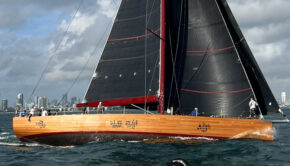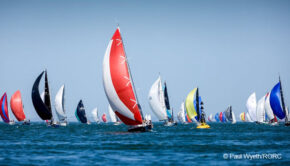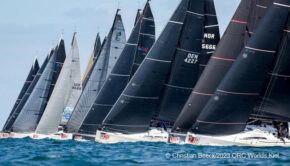Hope and progress for handicap racing
Published on November 21st, 2019
The growth of handicap racing has been capped in North America by the abundance of rating rules. While PHRF best serves the casual handicap racer on the local level, too many technical options – IRC, ORC, and ORR – has muddled the ability to reach further.
“No one needs lots of rating rules,” said James Dadd, past director of the RORC Rating Office for IRC. “Racing should be about getting out there, enjoying yourself and chatting at the bar about what you got right or wrong, and not about the rule.”
But we have lots of rating rules, each finding their region of popularity within the continent, effectively restricting advancement by limiting competition. People stay in their own turf, doing the same thing year after year, with no ability to aspire for anything else.
That is, until now.
Not every day does a handicap world championship come to the continent. In fact, it’s been since the 2000 IMS World Championship – two decades ago – but the 2020 ORC/IRC World Championships is now coming on September 25 to October 3 to Newport, RI.
These two dominant international rules are working together to increase participation… here’s an update from host New York Yacht Club:
Thousands of miles and 10 months of lead time are proving no deterrent for teams intent on ensuring their spot in one of the most anticipated sailing championships of 2020. In the few short weeks since entries opened, nearly 30 entries have registered for the 2020 ORC/IRC World Championships, exceeding organizers’ early expectations and laying a strong foundation for the regatta’s triumphant return to the United States after a two-decade absence.
Among the teams making the commitment to travel to the regatta is the Robin Team’s J/122 Teamwork from Winston-Salem, N.C. “It is a chance to race against the very best competition in a world-class venue run by the New York Yacht Club,” said Team. “They always run a great regatta, both on the water and shoreside.”
The 2020 ORC/IRC World Championship will bring top sailing teams from around the globe to battle on Rhode Island Sound and Narragansett Bay for one of three coveted world titles. The regatta will be scored using a combination of the two most popular rating rules in the sport, ORC and IRC, and racing will be a mix of around-the-buoys racing and longer, offshore courses.
Among the 28 entries to date are two each from Italy and Great Britain and one each from Germany, France, and Canada. This geographic spread is crucial to the regatta as ORC championship rules state that the number of competitors plus the number of countries represented within the fleet must total 14 or greater for each class to confer a world title to its winner.
With an impressive surge of 12 entries from four countries, including Tilmar Hansen’s TP52 Outsider from Kieler Yacht-Club in Germany, Class A has already met this requirement. This boat was brand new to Hansen at the last combined ORC/IRC Worlds in The Hague, Netherlands, in 2018, where he finished as runner-up to Karl Kwok’s gold medal-winning TP52 Beau Geste from Hong Kong.
“We are very much looking forward to coming to Newport next summer,” said Hansen. “Our plan is to race the RORC’s Caribbean 600 in Antigua in February, then ship the boat to race in Newport all summer in preparation for the Worlds.”
Outsider will have some strong competition in a brand-new Fox, Victor Wild’s Botin 52 currently under construction, and Vesper, a competitive TP52 from Southern California skippered by David Team (no relation to Robin). All three boats should be among the fastest boats, according to rating, in Class A.
Another interesting development is the three IC37s that have entered Class B. This boat, created for one-design racing by the New York Yacht Club, has recently had some success under IRC, including an overall win in the Hamble Winter Series on the Solent. So far 10 teams have entered Class B.
And Class C is also shaping up well with six teams from three countries, including Kevin Brown’s Farr 30 Notorious from Toronto and the Royal Canadian Yacht Club. His plan includes IRC and ORC racing in Florida in the SORC offshore series this winter, and says his boat “is in top form, getting ready for the Worlds now.”
The fleet will have tune-up opportunities at the venue during the 166th Annual Regatta—North America’s oldest annual sailing competition—and the 12th edition of Race Week at Newport presented by Rolex, both providing an opportunity to preview the racing formats and the scoring system that has been confirmed for the world championship.
Outsider, Teamwork and Notorious all plan to enter one or more of these pre-Worlds events.
“It’s really encouraging to see early entries from outside New England and across the Atlantic Ocean,” said event chair Patricia Young (Jamestown, R.I.), who will be racing her Tripp 41 Entropy in Class B. “The previous ORC/IRC World Championship, in The Hague in 2018, set a high bar in terms of entries and while we’re not sure we can reach that level—Europe remains the epicenter for both of these rating rules—we are that much more confident we’ll have a very strong and diverse fleet of yachts for the regatta.”
While this big boat handicap championship has been a staple of World Sailing’s regatta slate for many years, the concept of scoring it with two rules is quite new, having only been done once previously, in 2018 in The Hague. The scoring formula is a little more complex, but the end result is a competition that does a more consistent job of rewarding the best-prepared and most-talented teams regardless of the wind conditions.
“The system we agreed to we think will minimize differences in the two rule systems,” says ORC Chief Measurer Zoran Grubisa, who is co-chairing the event’s Technical Committee along with Jason Smithwick from IRC. “We believe this will be an improvement on what we did in The Hague two years ago.”
The basic mechanics of the scoring scheme are fairly straightforward. ORC Results will be calculated using the Coastal / Long Distance time-on-time scoring model, while inshore races will be scored using Performance Curve Scoring with a constructed course. IRC Results will be calculated using each yacht’s IRC time correction coefficient.
Corrected times calculated for ORC and IRC will be shown as deltas to the winning boat. The winning boat in each rating system in each class will have a corrected time of 00:00:00, and all others will have a corrected time calculated as the difference in time to the winner.
Finally, a single corrected time to determine the finishing place is calculated by averaging a yacht’s corrected times in ORC and IRC. That score alone will go on the team’s score card. The official scoring language can be found in Amendment 1 to the Notice of Race.









 We’ll keep your information safe.
We’ll keep your information safe.